Part 2: The Next Chapter for Beneficial Ownership Transparency in Nigeria
Earlier this year, we shared the first chapter of how Nigeria has leveraged the OGP platform to build political support for beneficial ownershipDisclosing beneficial owners — those who ultimately control or profit from a business — is essential for combating corruption, stemming illicit financial flows, and fighting tax evasion. Technical... More transparencyAccording to OGP’s Articles of Governance, transparency occurs when “government-held information (including on activities and decisions) is open, comprehensive, timely, freely available to the pub... More and meet important milestones like the passing of the Companies and Allied Matters Act (CAMA) bill. Now, we will explore Nigeria’s recent progress, including joining the Beneficial Ownership Leadership Group and advancing the beneficial ownership register. We reflect on what factors may have contributed to these outcomes, including the role of a high-level country visit by the OGP Support UnitThe OGP Support Unit is a small, permanent group of staff that work closely with the Steering Committee and the Independent Reporting Mechanism to advance the goals of the Open Government Partnership.... (SU) and the extent to which these enabled key government and civil society champions to consolidate progress made under their current action planAction plans are at the core of a government’s participation in OGP. They are the product of a co-creation process in which government and civil society jointly develop commitments to open governmen... and pave the way for further reforms before the 2023 election.
This story is part of a series called Reform in Action, which demonstrates how the OGP model contributes to domestic open government results.
Sustaining Beneficial Ownership Reforms Beyond Political Transitions
Nigeria’s open government reform agenda is one of the most ambitious and comprehensive across all OGP countries. Nigeria’s OGP commitments address the most important challenges Nigeria faces, including anti-corruption, public service delivery, and civic space. Through the implementation of their action plans, Nigeria has made commendable progress in key areas like beneficial ownership transparency, fiscal and budget transparency, and public services. And we’ve already seen these reforms make an impact, such as Nigeria’s 24-point improvement in the 2021 Open Budgets Survey, one of the biggest improvements across 120 countries.
 Reform in Action
Explore how reformers from across the globe leverage their engagement with OGP to achieve their open government goals and how incremental progress can lead to systemic change.
Reform in Action
Explore how reformers from across the globe leverage their engagement with OGP to achieve their open government goals and how incremental progress can lead to systemic change.
Because of this commendable progress, the upcoming 2023 national electionsImproving transparency in elections and maintaining the independence of electoral commissions is vital for promoting trust in the electoral system, preventing electoral fraud, and upholding the democr... More represent a critical moment to cement these gains. Government and civil society are taking targeted, concrete, and practical actions before these elections to see their commitments through the finish line.
To consolidate progress and set the path for sustainability across these elections, in July of this year, the OGP Support Unit (SU) conducted a high-level visit to meet with key leaders involved in the implementation of the current action plan. This trip was intended to advance the implementation of existing OGP commitments, including establishing a beneficial ownership transparency register supported by the OGP-Multi-Donor Trust Fund. The Support Unit visit also involved supporting the co-creation of Nigeria’s third national action plan and holding community consultations on the OGP strategic refresh.
The OGP SU held meetings with key stakeholders, including the government, the private sector, civil society, donors, and published communications about Nigeria’s progress, resulting in an action-forcing moment for beneficial ownership reform before the national elections. Ahead of the visit, the OGP SU took advantage of the progress made by key reformers to engage stakeholders on two important but outstanding issues: the country’s official membership in the Beneficial Ownership Leadership Group, and progress on the Multi-Donor Trust Fund-supported beneficial ownership register. During the visit, Nigeria announced its new membership in the Beneficial Ownership Leadership Group, a group initiated by the UK government and now co-convened by Open Ownership and OGP. Other members include Armenia, Kenya, Latvia, Mexico, Norway, the Slovak Republic, and the United Kingdom. Nigeria’s membership in this group reflects the country’s deep commitment to implementing best practices in beneficial ownership transparency and positions the country as a role model for other governments worldwide. Furthermore, the Corporate Affairs Commission (CAC) showcased a prototype of its new beneficial ownership register, a key tool for fulfilling the promises of the Companies and Allied Matters Act (CAMA) bill. This register aims to improve corporate accountability by opening up the information needed to hold government and businesses accountable and help halt the illicit flow of more than US$15.7 billion through the country.
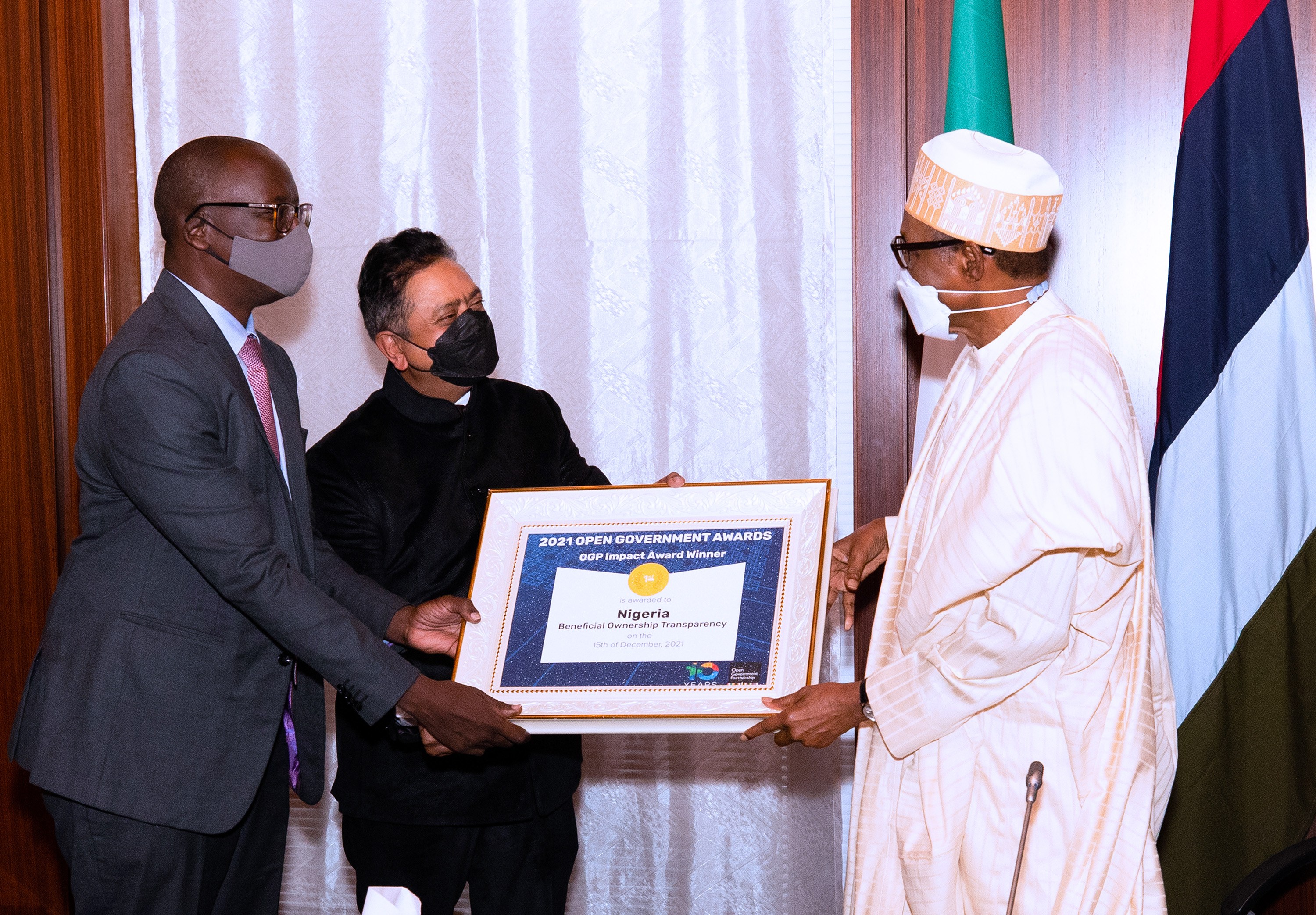
OGP Steering CommitteeThe Steering Committee is OGP’s executive decision-making body. Its role is to develop, promote and safeguard OGP’s values, principles and interests; establish OGP’s core ideas, policies, and ru... Co-Chair Aidan Eyakuze and OGP Chief Executive Officer Sanjay Pradhan present President Buhari with Nigeria’s 2021 OGP Impact Award at the OGP Support Unit’s High-Level Visit to Nigeria.PHOTO: Credit: OGP Nigeria
OGP’s communication team captured and shared news of the visit throughout the week, spotlighting and celebrating Nigerian reformers. These communications included over 20 mentions in print, digital, and streaming media, TV interviews, media huddles, and press conferences organized and supported by the OGP Nigeria Secretariat and the OGP SU, and a press release. OGP also shared highlights from the week on social media.
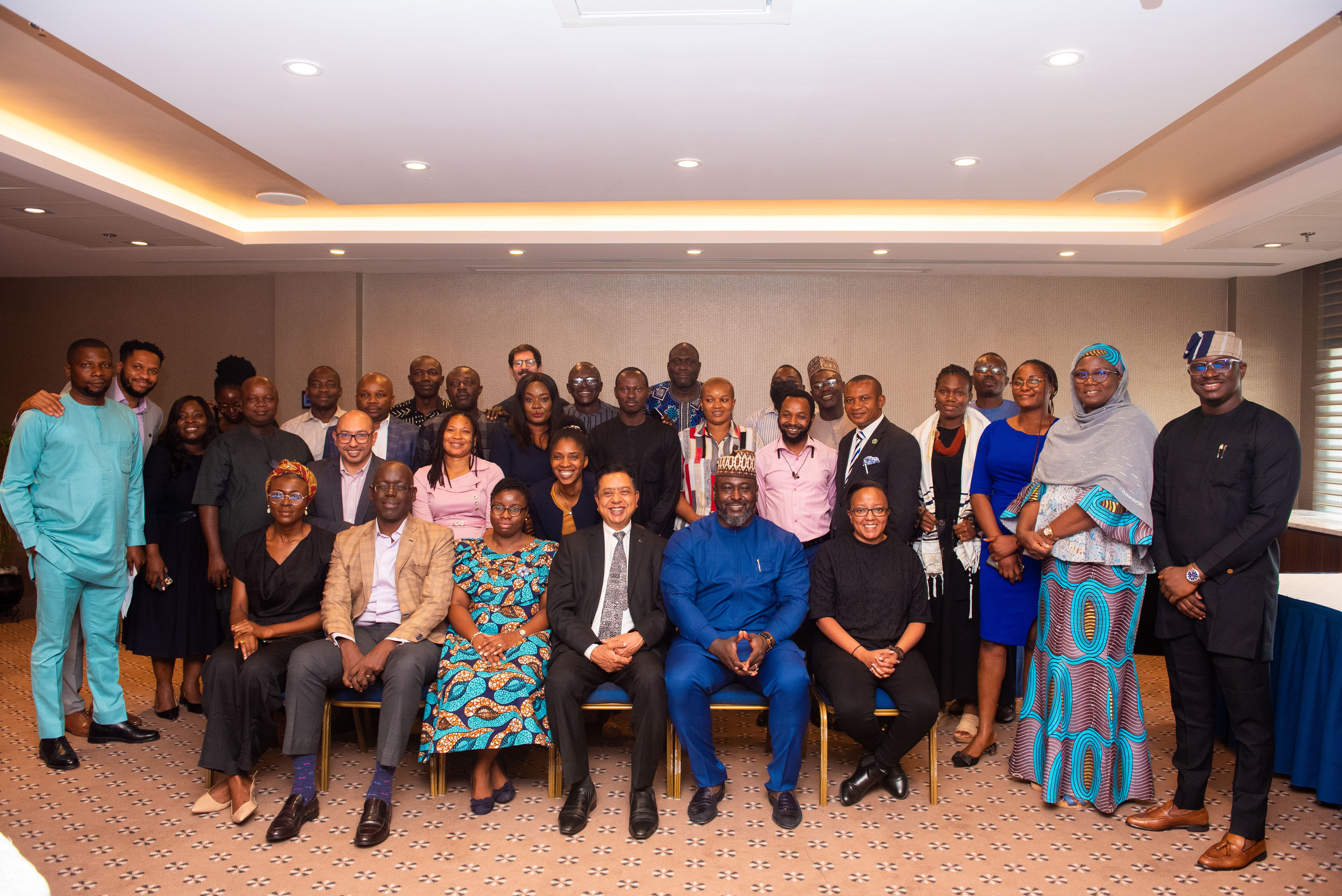
The OGP Support Unit met with civil society organizations to discuss progress and opportunities for their continued OGP engagement.PHOTO: Credit: OGP Nigeria
Lessons Learned
High-level country visits from the OGP Support Unit are highly-teachable moments for OGP. They allow us to witness how local reformers interact with other stakeholders and build support for reforms in their unique political contexts. They lead to a fuller appreciation of the relationships we build with reformers on the ground, their individual and collective power to navigate challenges, and how best we can support them in their work.
- Country visits can be action-forcing moments: This visit was an opportunity to consolidate and sustain progress made on beneficial ownership reforms regardless of the outcome of the elections. Nigerian government and civil society reformers successfully leveraged this moment and worked with the OGP SU, Open Ownership and development partners like the Foreign and Commonwealth Development Office (FCDO) and World Bank to secure two important milestones: joining the Beneficial Ownership Leadership Group and showcasing a prototype of the beneficial ownership register. Through strategic communications, the OGP team leveraged print and digital media to share this exciting progress with both a domestic audience and the wider OGP community and celebrate Nigeria’s successes.
- Investing in reformers works: OGP has always believed in championing the central role of committed, enthusiastic, and influential reformers in pushing for change and investing in their leadership skills. For example, OGP has profiled Minister of State, Budget and National Planning and Nigerian OGP Co-Chair Clem Agba and Registrar General Alhaji Abubakar Garba in regional and global OGP events and stories. (See our recent OpenStories video and Faces of Open Gov profile.) Agba’s leadership and influence proved critical in having Nigeria’s membership in the Beneficial Ownership Leadership Group officially approved by President Buhari. Nigeria’s Minister of Finance, Budget & National Planning Zainab Shamsuna Ahmed was one of 30 leaders convened by OGP in 2018 at the Rockefeller Foundation Bellagio Center for a program aimed at enabling champions to work toward smarter and more ambitious open government reforms. OGP has also profiled reformers and organizations in civil society, including from organizations such as BudgIT and the Public and Private Development Centre (PPDC). Their proactive role in advancing open government in Nigeria is a testament to the value of OGP investing in reformers who are in a position to take reforms forward.
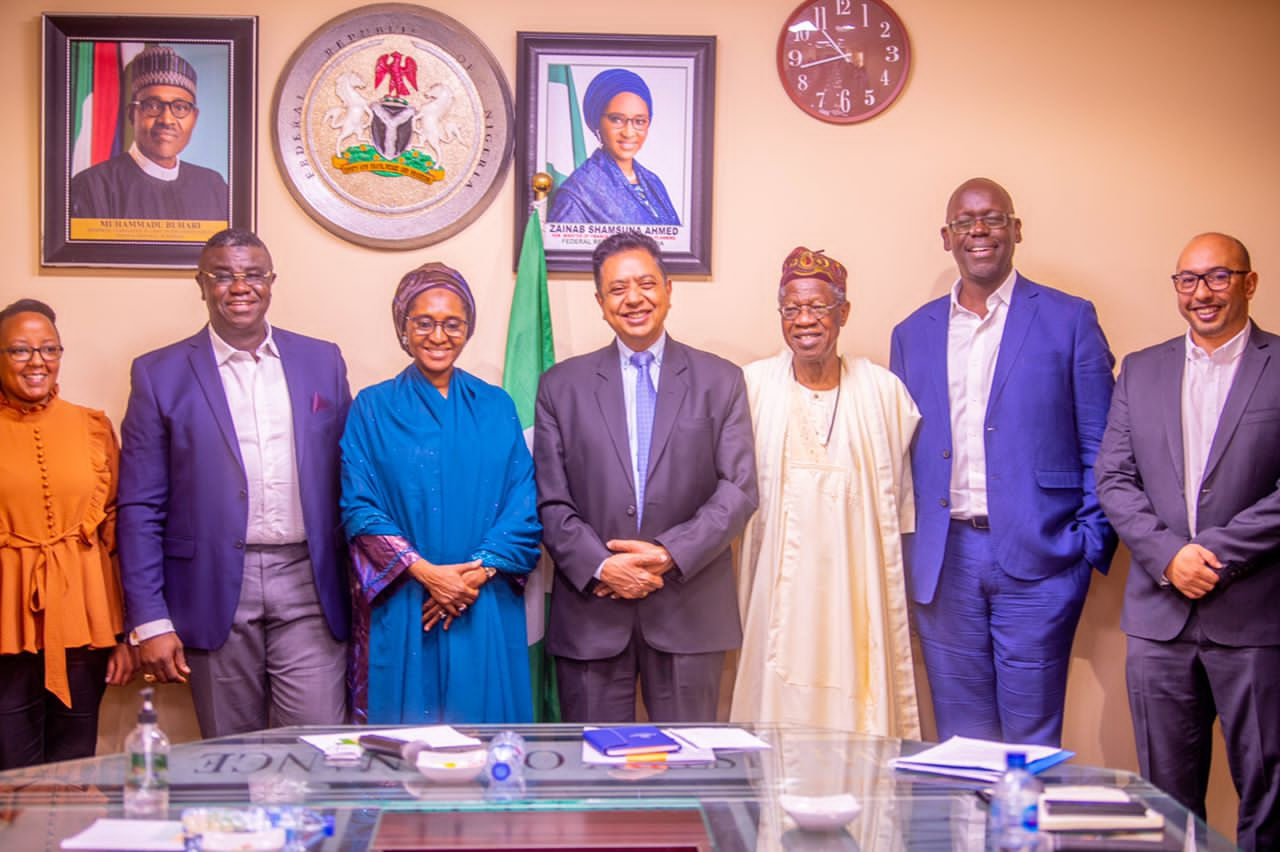
OGP Support Unit staff and high-level Nigerian reformers gathered for a country visit in July 2022. From left to right: OGP’s Maureen Kariuki, Minister Clem Agba, Minister Zainab Shamsuna Ahmed, OGP CEO Sanjay Pradhan, Minister of Information and Culture Alhaji Lai Mohammed, OGP Co-Chair Aidan Eyakuze, and OGP’s Tarik Nesh-Nash.PHOTO: Credit: OGP Nigeria
- Coordinating OGP domestically is a huge task but pays off: Successfully coordinating all the moving parts in Nigeria at the federal and state levels was only possible because of a well-staffed and well-resourced team in Nigeria. It is a huge ask of reformers, especially those in government, to broaden and deepen OGP engagement and ensure credible implementation of commitments. The Secretariat, which is composed of key open government champions within the Nigerian government, has been essential in fostering political support for beneficial ownership transparency reform and coordinating the complex moving parts across ministries, departments and agencies at the state and federal level. Without the Secretariat coordinating across government and ensuring civil society participation across the entire action plan cycle, it is unlikely that these open government reformers will be able to advance their work to its full potential. Thanks to the Secretariat, Nigeria has broadened and deepened its OGP engagement and made strides in the implementation of its commitments.
- Transitions are challenging but also present opportunities: As many OGP members can attest, government and bureaucratic transitions are a core challenge for the OGP model. As part of the development of OGP’s new strategy, the community is currently exploring how to better safeguard the OGP process when members go through transitions. For example, Nigeria is looking to have an executive order signed by President Buhari that would institutionalize OGP by, for example, appointing a national coordinator to serve as CEO of the OGP Secretariat, responsible for its day-to-day operations. It would also direct sufficient budgetary allocation for the smooth running of the Secretariat beyond the 2023 election.
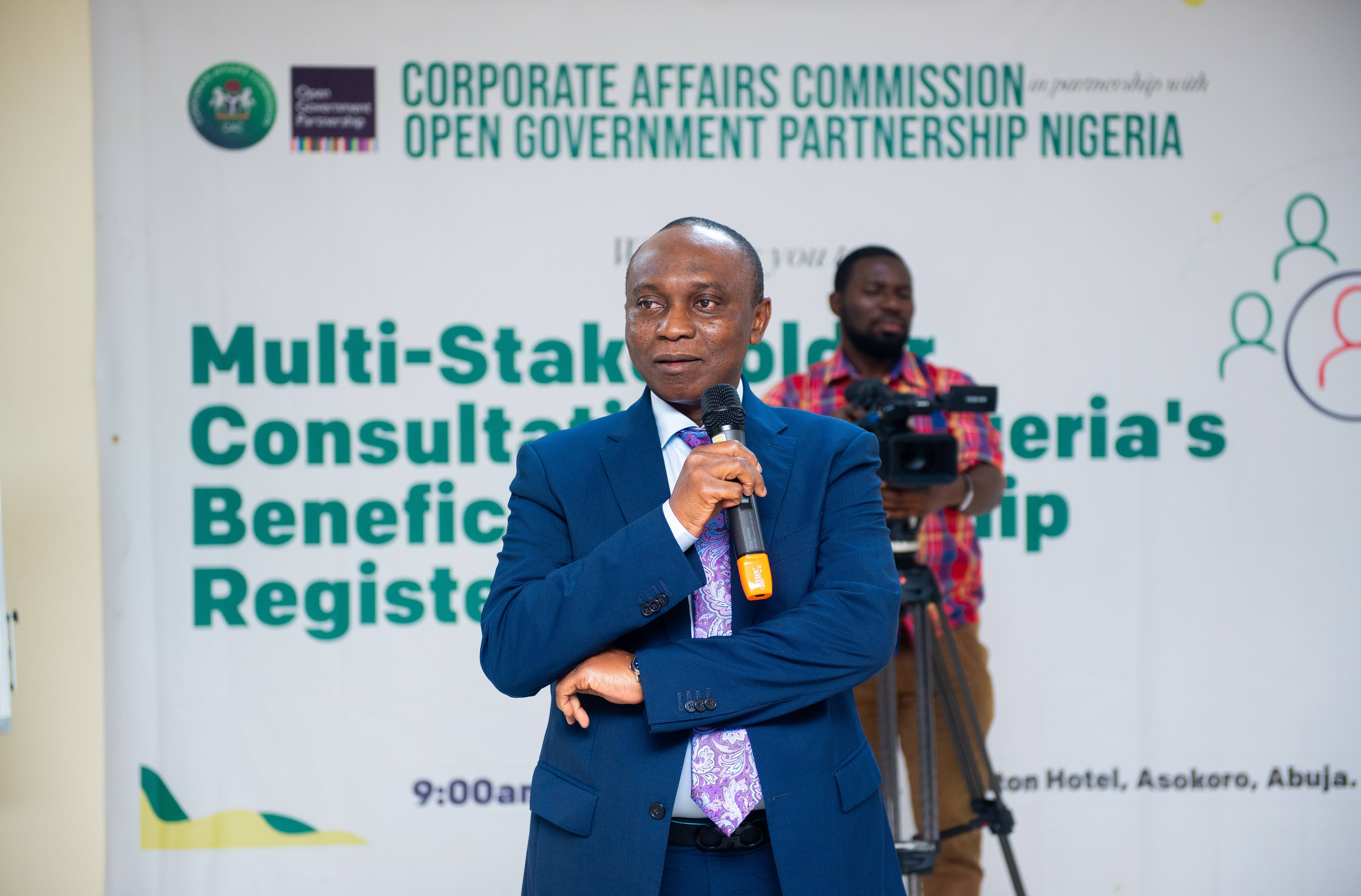
Registrar General Alhaji Abubakar Garba speaks about the development and launch of the country’s first beneficial ownership register.PHOTO: Credit: OGP Nigeria
What’s Next?
In this last sprint towards the national elections, the Nigerian government and civil society actors leading on the open government agenda are focusing on leaving the strongest legacy they can. In the coming months, we may see tangible wins like the improvement and operationalization of the beneficial ownership registry prototype.
Once the new administration comes on board, Nigerian civil society organizations, who have shown themselves to be deft and strategic across changing political winds, will likely band together to present their prioritized asks for open government and forge partnerships with new government allies. This will help them lock in their interests with the next administration early on. The strong collaboration of the Nigerian government, civil society, and the private sectorGovernments are working to open private sector practices as well — including through beneficial ownership transparency, open contracting, and regulating environmental standards. Technical specificat... More demonstrated in working together on Nigeria’s current action plan will hopefully continue, ensuring sustainability of the open government agenda across administrations.
Nigeria continues working on priority reform areas that are essential for the current administration to leave its legacy and plant the seeds of impact beyond the upcoming elections. These include developing a strong supreme audit institution, ensuring fairer public procurementTransparency in the procurement process can help combat corruption and waste that plagues a significant portion of public procurement budgets globally. Technical specifications: Commitments that aim t... More processes, installing anti-corruption mechanisms in the extractive industriesApplying open government values of transparency, participation, and accountability to extractive industries can decrease corruption, safeguard community interests and needs, and support environmental ..., and creating more protections for civic space. The excellent progress Nigeria has made on several key issues like beneficial ownership transparency and open budgets and its position as a regional and global leader in open government signals their ability to successfully overcome these challenges.
No comments yet
Related Content
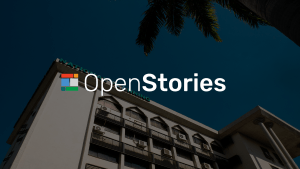
From Commitment to Law of the Land: Beneficial Ownership Transparency in Nigeria
Shell companies are often a major enabler of corruption and financial crime. To tackle this, Nigerian reformers in government and civil society came together to establish a registry to disclose…

Beneficial Ownership
Beneficial ownership transparency has emerged as an important policy tool in countries for combating corruption, stemming illicit financial flows, and fighting tax evasion.

Reform in Action
Explore how reformers from across the globe leverage their engagement with OGP to achieve their open government goals and how incremental progress can lead to systemic change.

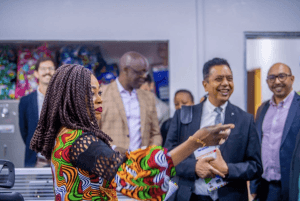
Leave a Reply